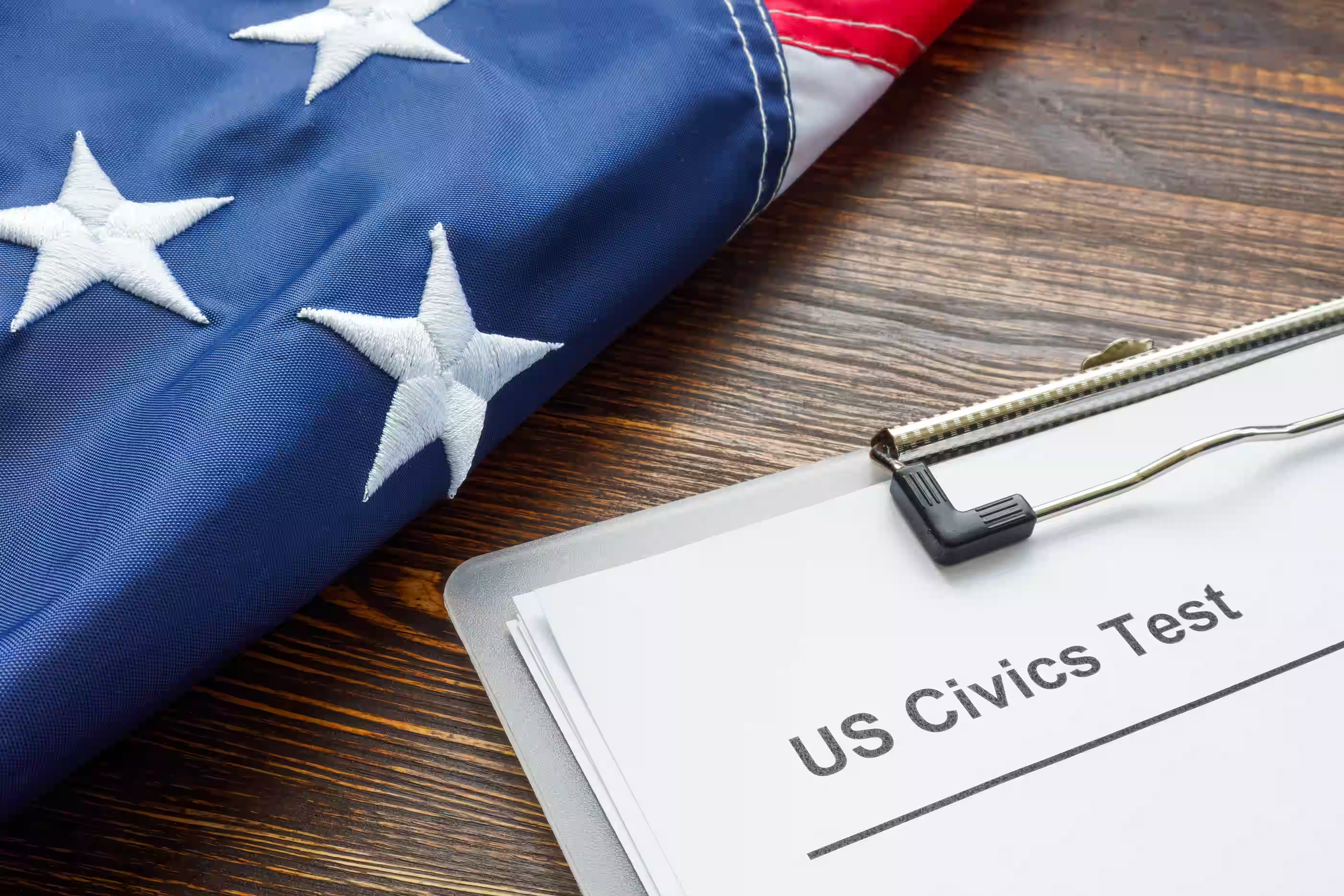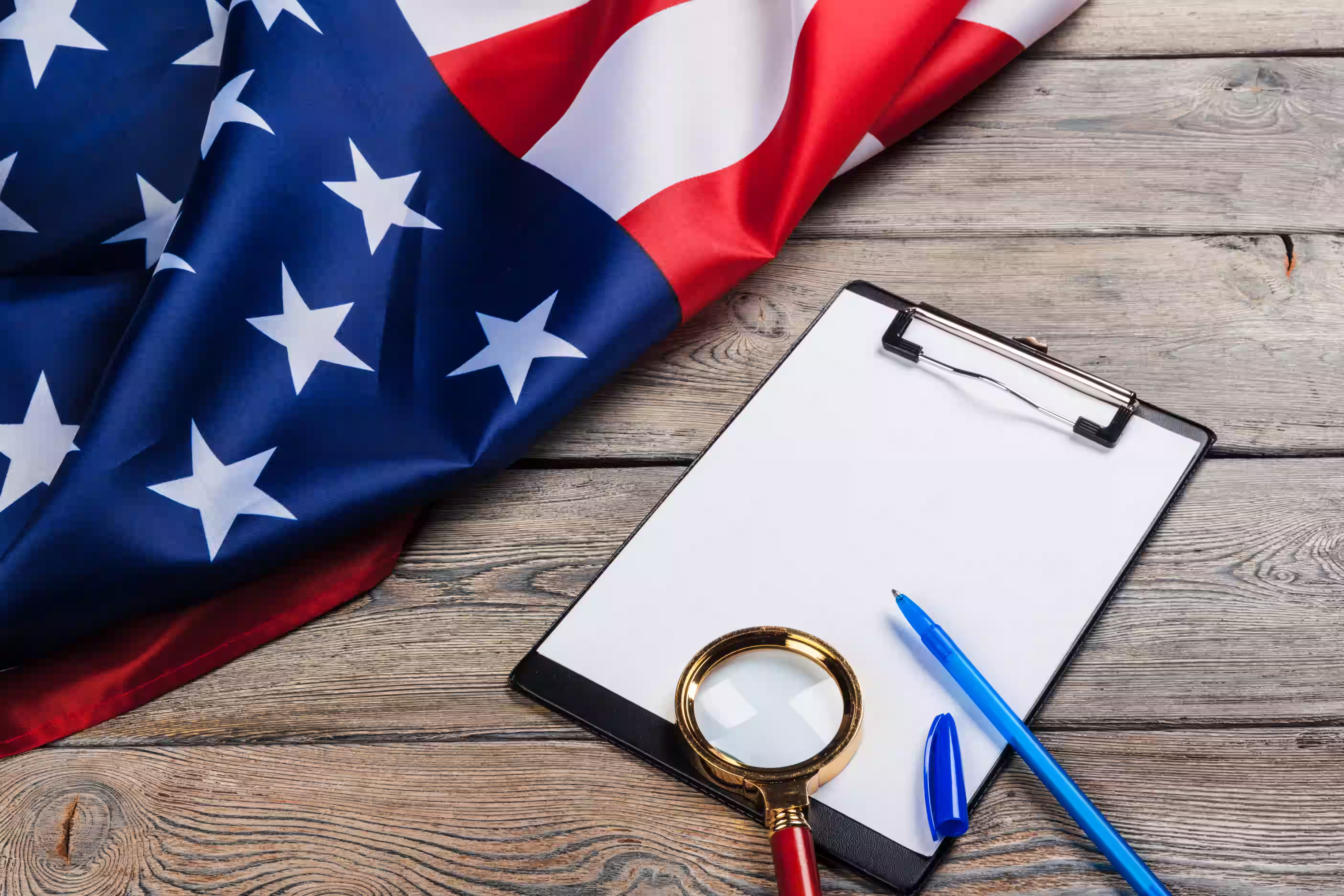Everything You Need to Know About the U.S. Citizenship Test
December 22, 2025
Table of Contents

Preparing for the U.S. Citizenship Test
If you have permanent residency in the U.S., applying for naturalization is the final step toward becoming a U.S. citizen – but as part of the naturalization process, you’ll have to take a citizenship test. As Austin immigration attorneys, we get a lot of questions about the U.S. citizenship test: what’s on it, how long is it, and how can someone study for it?
These are answers to the most asked questions about the citizenship test, as well as a few tips from the pros – that way, you’ll be as prepared as possible when it’s your turn to take it.
The Test for U.S. Naturalization: What to Know Before You Apply
The citizenship test – also called the naturalization test – is a test you take on the same day that you talk to a USCIS officer for your naturalization interview. The test consists of two parts: English and civics. During the test, you must answer six of ten questions to pass, and all the questions are asked orally.
For most people, the citizenship interview questions aren’t incredibly difficult. U.S. Citizenship and Immigration Services has a list of possible questions on its website – and you can study the questions and answers as much as you’d like to before you take your test. However, if you have a condition that affects your ability to learn or speak English, you may be eligible for an exemption from the English portion of the test. You can request this exemption during your naturalization interview.

Parts of the Naturalization Test: Civics, English & More
Part 1: What Is The English Test for U.S. Naturalization?
The English test evaluates your ability to read, write, and speak in English. During the interview, you’ll demonstrate these skills as you answer questions and interact with the officer. For the reading test, you’ll read a sentence aloud, and for the writing test, you’ll write a dictated sentence. Both tests ensure you can communicate effectively in everyday English.
The English test has three parts of its own:
- Speaking. The USCIS officer who interviews you will evaluate your ability to speak English.
- Reading. You must read one out of three sentences correctly to demonstrate that you can read in English. This is the Reading Test Vocabulary List from USCIS.
- Citizenship Writing Test. You must write one of three sentences correctly to demonstrate that you can write in English. This is the Writing Test Vocabulary List from USCIS.
Part 2: What is the Civics Test?
The civics part of the naturalization test covers U.S. history and government, including the Constitution, the Bill of Rights, and key events and figures. All possible questions and answers are available to study beforehand. Review the material before test day, as the officer will ask ten verbal questions. You only need six correct answers to pass.
There is a pool of 100 history and government questions that USCIS officers can ask, and officers may ask up to ten questions. You must answer six out of ten questions correctly to pass this part of the test.
There’s no written section of the civics part of the citizenship test – it’s all oral. Some of the naturalization test questions could include:
- Name one U.S. territory.
- Why does the flag have 13 stripes?
- There were 13 original states. Name three.
- What are two rights in the Declaration of Independence?
- Who makes federal laws?
- What did Susan B. Anthony do?
You can study the civics questions here and look at how they’ve been categorized here. And don’t worry – for most people, the citizenship test is a lot easier than they think it will be. The pass rate averages over 90 percent. As soon as you answer six questions correctly, the USCIS officer will stop asking; that means if you get the first six questions right, you don’t have to answer any more.
If you cannot answer six of the ten questions correctly, don’t worry – you’ll get another chance to take the test (and you’ll have more time to study).
Exemptions and Accommodations When You Take the U.S. Citizenship Test
Some people qualify for exemptions and accommodations during the test. Most notably, individuals with disabilities or who are a specific age and have lived in the U.S. for a certain number of years.
What is the 50/20 Special Consideration on the Citizenship Test?
Some applicants are exempt from the English language requirements for naturalization and may take the civics test in any language they’d like. This exemption applies to individuals who are over the age of 50 and have been a permanent resident of the United States for at least 20 years (that’s why it’s called 50/20).
What is the 55/15 Exemption to the English Language Requirement?
If you’re age 55 or older at the time you file for naturalization and you have lived in the United States for 15 years, you’re exempt from the English language test. Like those who meet the criteria for the 50/20 exemption, you must still take the civics test.
What is the 65/20 Exemption?
If you are age 65 or older and have been a permanent resident in the U.S. for at least 20 years at the time you file your application, you receive special consideration (in addition to being exempt from the English language requirement). The people who take this test are only required to study 20 questions for the naturalization test, as well. Those questions are:
- What is one right or freedom from the First Amendment?
- What is the economic system in the United States?
- Name one branch or part of the government.
- What are the two parts of the U.S. Congress?
- Who is one of your state’s U.S. senators now?
- In what month do we vote for president?
- What is the name of the President of the United States now?
- What is the capital of your state?
- What are the two major political parties in the United States?
- What is one responsibility that is only for United States citizens?
- How old do citizens have to be to vote for president?
- When is the last day you can send in federal income tax forms?
- Who was the first president?
- What was one important thing that Abraham Lincoln did?
- Name one war fought by the United States in the 1900s.
- What did Martin Luther King, Jr. do?
- What is the capital of the United States?
- Where is the Statue of Liberty?
- Why does the flag have 50 stars?
- When do we celebrate Independence Day?
What About Medical Disability Exceptions?
If you are unable to comply with the requirements for the English or civics portion of the citizenship test due to a medical disability, you may be exempt. However, your attorney should file Form N-648, Medical Certification for Disability Exceptions, with USCIS after it has been completed by a licensed medical or osteopathic doctor or by a licensed clinical psychologist.
What Are Continuous Residence Exceptions on the Citizenship Test?
Some individuals engaged in overseas employment are eligible for exceptions to the continuous residence requirement. You should consult with your attorney if you work overseas and are interested in pursuing your U.S. citizenship – they will be able to determine whether you qualify for a continuous residence exception.
Disability Accommodations
The U.S. government is required by law to provide accommodations or modifications for applicants who have physical or mental impairments that make it difficult or impossible to complete the naturalization process. If you need of accommodations, your attorney should include your needs in the space provided for that purpose on Form N-400, Application for Naturalization.
What Happens If You Fail the U.S. Citizenship Test?
If you fail the U.S. citizenship test, it’s not over. You have two chances to take each test (English and civics). If you fail one part and not the other, you don’t have to take both tests over again. You’ll be retested on the part of the test you failed within 60 to 90 days from your initial interview date.
If you fail the test a second time, your naturalization application will be denied. However, you can still reapply, but you’ll need to restart the process and pay the application fee again. Use this time to study and prepare thoroughly. Many online resources, study guides, and community programs are available to help you pass the English and civics tests, increasing your chances of success.
How to Prepare for the English Test
The official conducting your interview will evaluate your ability to understand and speak English from the moment you walk in the door. Remember:
- If you don’t understand a question, it’s always okay to ask the USCIS officer to repeat it or rephrase it.
- You don’t have to speak perfect English. You need to show that you know enough to get by through basic communication.
- You can study for the English portion of the test by practicing your vocabulary, your writing skills, and your listening skills. USCIS provides several tools that you can use to study, as well (listed in the earlier section, “English”).
How to Prepare for the Civics Test
The best way to prepare for the civics portion of the test is to study the list of 100 potential questions provided by USCIS. Your interviewer will only ask you questions from this list, and your answers do not have to be perfect. For example, if the officer asks you, “What are the two parts of the U.S. Congress,” you can say “The Senate and House” or “The Senate and House of Representatives.”
What Else Happens at Your Citizenship Interview (Aside From the Citizenship Test)?
During your citizenship interview, you’ll take the citizenship test – but a U.S. Citizenship and Immigration Services officer will also interview you. The officer will ask to see your identification, place you under oath, and ask you questions that may relate to things like:
- Your background
- Your character
- How attached you are to the U.S. Constitution
- Whether you have evidence supporting your case
- Where you live and how long you’ve lived there
- Your willingness to take the Oath of Allegiance to the United States
You’ll certainly need to review your entire N-400 application before you show up at your citizenship interview – it’s what the USCIS official will use to test your English skills and to confirm that the answers you give are correct. If the official interviewing you notice any differences between the answers on your application and your oral answers, they may ask you to explain why. You should be prepared to offer any information you have. Everything that happens during this part of the interview is part of your English test; the official is determining whether you can communicate in English. Don’t stress about it too much – you don’t have to speak with perfect grammar to pass. You simply have to show that you speak enough English to get by.
U.S. Citizenship Test FAQ
Are Tax Returns Required for Naturalization Interviews?
Tax returns are an important part of the naturalization process. During your interview, the USCIS officer may ask to see your recent tax returns to confirm compliance with U.S. tax laws. If you’re applying based on marriage to a U.S. citizen, you may need to provide proof of joint tax returns. Bring copies of your tax documents to the interview to avoid delays. Failure to provide them or address issues could affect your application.
Should You Bring Your Spouse to the Naturalization Interview?
If you’re applying for naturalization based on marriage to a U.S. citizen, it’s usually a good idea to bring your spouse to the interview unless USCIS says otherwise. The officer may ask questions to verify your relationship, and having your spouse there can provide support and help address any concerns. However, if USCIS states your spouse doesn’t need to attend, follow their instructions. Always review your interview notice carefully and contact USCIS with any questions you may have.
What Should You Wear to a Naturalization Interview?
Dressing appropriately for a naturalization interview shows respect for the process and seriousness about becoming a U.S. citizen. While there’s no official dress code, business casual or formal attire is best—think a blouse, button-down shirt with slacks or a skirt, or a modest dress. Avoid overly casual clothing like jeans, slogan t-shirts, or flip-flops, as they may seem unprofessional. Your appearance should reflect professionalism and the importance of the occasion.
What Do You Need to Bring to the Naturalization Interview?
When attending your naturalization interview, bring all required documents to avoid delays. This includes your Appointment Notice (Form I-797C), green card, a valid passport, and a state-issued ID, such as a driver’s license. Also, bring any documents requested in the interview notice, such as proof of marital status, certified translations, or evidence supporting your application. It’s helpful to have copies of your N-400 application for reference. Being organized shows your preparedness and commitment to the process.
Do You Need to Talk to an Attorney About the Citizenship Test (or Any Other Immigration Issue)?
If you need to speak with an attorney about any aspect of your immigration or naturalization process, including taking the citizenship test, we’re here for you. Call our office now to schedule your consultation; we’ll be happy to answer your questions and get you started on the right path to naturalization.
Share this Page
Schedule a Consultation with Nanthaveth & Associates
Get a brief consultation from our team. With our experienced immigration attorneys by your side, you’ll get the personalized guidance necessary for success.
Are you in need of help from an Immigration Attorney?
Don't hesitate to contact Nanthaveth & Associates. We have helped many people in the same situation as you. Contact us today for a FREE consultation.
Schedule a Consultation
Or call us







